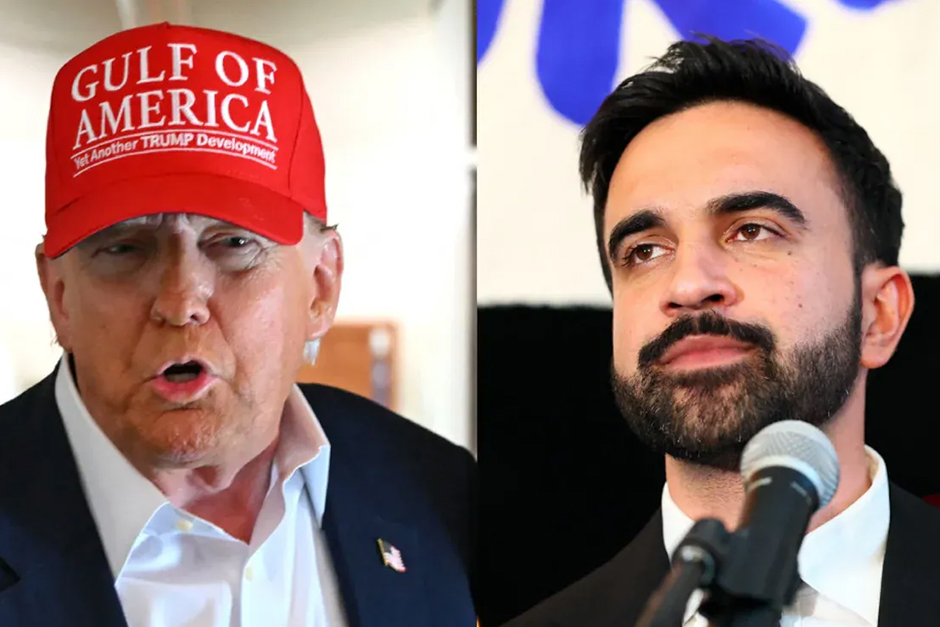In the high-stakes arena of American politics, where rhetoric often mirrors the intensity of a subcontinent cricket match, certain labels carry immense historical weight and immediate political charge. One such term, “fascist,” has once again found itself at the centre of a heated debate, reaffirmed by an Indian-American voice in the New York State Assembly. Zohran Mamdani, the progressive representative for Astoria, Queens, has unequivocally stood by his past assertion, stating, “Said it in past, say it today,” when referring to former President Donald Trump.
This unwavering stance by Mamdani, a prominent figure among a new generation of Indian-American politicians making their mark in the US, underscores the deeply polarized nature of contemporary political discourse. His reaffirmation isn’t just a casual remark; it’s a deliberate ideological statement, echoing sentiments held by a significant segment of the American left and progressive movements globally, including those who keenly observe US politics from India.
Zohran Mamdani’s Consistent Critique
Zohran Mamdani, son of acclaimed Indian filmmaker Mira Nair and Ugandan academic Mahmood Mamdani, has carved out a distinct political identity since his election in 2020. Representing a diverse district in New York City, he is known for his progressive leanings and affiliation with the Democratic Socialists of America. His recent comments, which resurfaced during a public discussion, were not a new accusation but a re-endorsement of a long-held view regarding Donald Trump’s political style and policies.
Mamdani’s assertion comes amidst ongoing discussions about Trump’s influence on the Republican Party and his potential return to the presidency. For critics like Mamdani, Trump’s rhetoric – characterized by strong nationalist appeals, challenges to democratic institutions, demonization of opponents, and a cult of personality – exhibits parallels with historical fascist movements. The repeated use of phrases like “enemies of the people,” attacks on the judiciary and media, and calls for political retribution have fueled such comparisons from his detractors.
Mamdani’s articulate and firm reiteration of his position signifies a commitment to defining political boundaries and challenging what he perceives as authoritarian tendencies. His refusal to retract or soften the term reflects a conviction that such strong language is necessary to accurately describe and counter perceived threats to democratic norms. This resolute stance, particularly from a legislator of Indian heritage, resonates in many parts of the world, including India, where political labels and intense debates about national identity are also common.
The Potency and Peril of ‘Fascism’
The term “fascism” itself is a charged one, laden with the grim history of 20th-century European dictatorships like those of Mussolini and Hitler. Historically, it refers to a political ideology and movement characterized by ultranationalism, dictatorial power, forcible suppression of opposition, and strong regimentation of society and economy. Its application in contemporary politics is highly contentious, sparking intense debate over its accuracy and appropriateness.
For those who align with Mamdani’s viewpoint, the use of “fascist” is not merely an insult but a diagnostic tool, suggesting that certain modern political figures exhibit traits or pursue policies that, while not exact replicas of historical fascism, share dangerous similarities. They point to patterns of authoritarian behaviour, the undermining of democratic institutions, the fostering of division, and the use of inflammatory rhetoric as justification for employing such a weighty term.
Conversely, critics argue that applying “fascist” too broadly or lightly trivializes the historical atrocities committed by genuine fascist regimes and can be a form of hyperbole that stifles productive political discourse. They contend that while Trump’s presidency was controversial, it operated within the confines of American constitutional democracy, and thus, the label is an inaccurate and inflammatory exaggeration. Understanding this divide is crucial to comprehending the depth of the political chasm Mamdani’s statement highlights.
An Indian-American Perspective on Global Politics
Zohran Mamdani’s voice, as an Indian-American legislator, adds another layer of significance to this debate. The growing presence of Indian-Americans in US politics—from Vice President Kamala Harris to numerous state and federal representatives—means that their perspectives increasingly shape not just American policy but also global political discourse. For an Indian audience, Mamdani’s statements offer a fascinating insight into how diaspora communities engage with and influence the political narratives of their adopted homes, often drawing on unique cultural and historical lenses.
His willingness to use such a strong term against a former US President reflects a political courage and conviction that many in India, accustomed to their own robust and often confrontational political debates, might recognize. It highlights the increasingly interconnected nature of global politics, where an American legislator’s critique of a US leader resonates with political observers and activists across continents, including back in India where the rise of nationalism and strongman politics is also a subject of intense scrutiny.
Ultimately, Mamdani’s steadfastness in calling Donald Trump a fascist serves as a potent reminder of the ongoing ideological battles shaping the modern world. It underscores the profound disagreements over the nature of leadership, democracy, and the boundaries of acceptable political behaviour, not just in America, but in every nation grappling with populist movements and strong political personalities.
The debate surrounding such labels is far from over, and figures like Mamdani ensure that the discussion remains front and centre, challenging observers both within the US and globally to critically examine the forces at play in contemporary politics.




